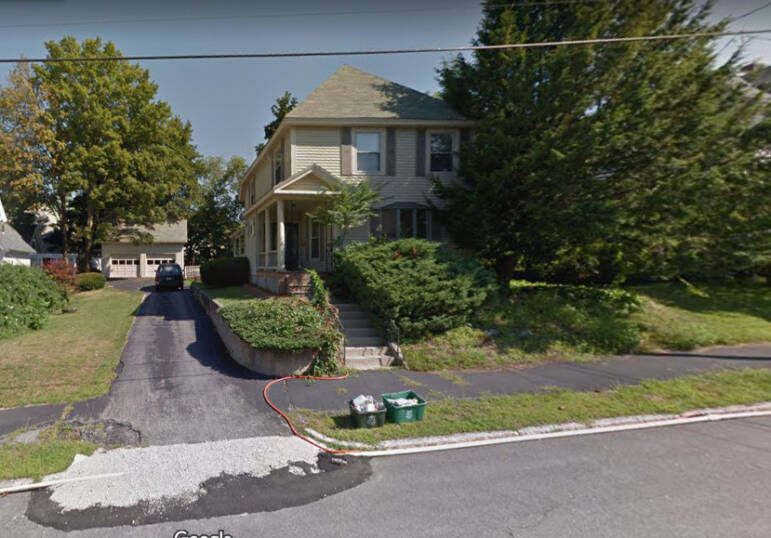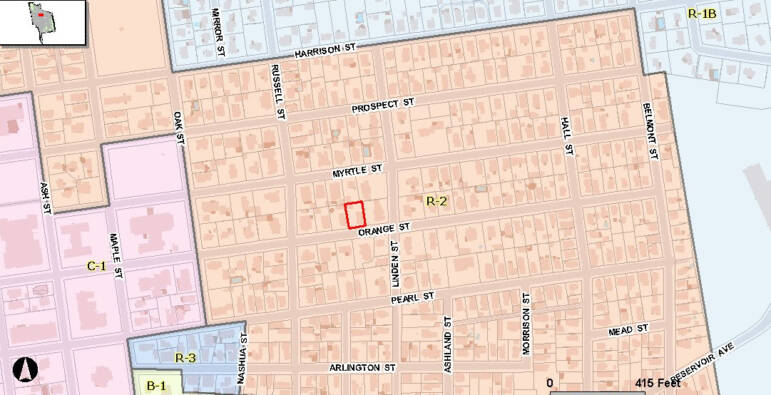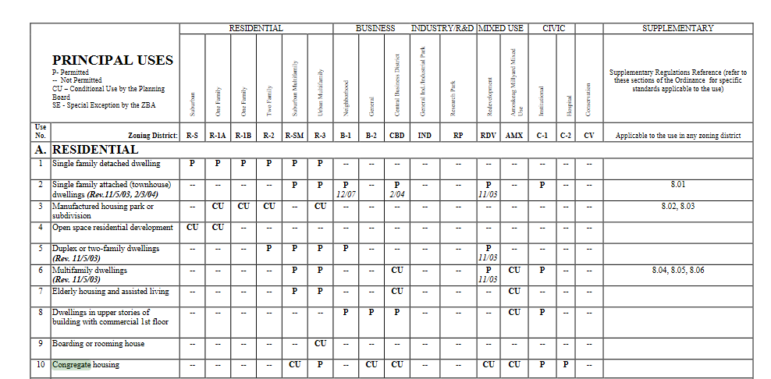
MANCHESTER, NH – Several variances requested by a congregate housing organization on Orange Street were unanimously denied by the Manchester Zoning Board of Adjustment (ZBA) on Wednesday, with the board disputing the applicant’s claims that their circumstances required “reasonable and necessary” accommodations.
Attorney Andrew Tine and Jonathan Gearson of Into Action Sober Living came to the board requesting to convert 296 Orange St. from a single-family home into congregate housing use on a lot with 8,250 square ft. where 10,000 square ft. are required, with 75 feet of lot frontage where 100 feet is required and a side yard setback of 2 feet where 20 feet is required.
Tine and Gearson requested that the board view the 11 residents of the home – which is already being used as a congregate living facility – as a family and thus exempt it from zoning ordinances, a request given in other instances such as another congregate living facility on Dubuque Street. If that would not be acceptable, they felt that the requests should be accepted under the Fair Housing Act, which prohibits discrimination in housing under federal law.
Under the city’s zoning ordinance, congregate living facilities are described as “Multifamily housing or other dwelling units serving individuals who require on-site services that support independent living, including, at a minimum, communal dining facilities,” and “may be characterized by on-site personal care services, housekeeping and linen service, and the supervision of self-administered medication, but excluding 24-hour nursing care.”
Several individuals spoke in favor of the facility and its impact on the lives of women living now and in recent years at the facility who are recovering from substance abuse. One of those women was Chelsea Driscoll, who felt that its impact on its occupants should be taken into account.
“The women in our house are becoming productive members of society, which is what you should want as a city,” she said.
Opponents of the request living near the property also made their voices heard. While no one opposed the concept of a congregate living facility for those in recovery from substance abuse, often known as “sober homes,” they opposed a sober home at that site.
Reasons for opposition included the site’s impact on nearby property values, safety concerns following an overdose incident in 2019 and the fact that the applicants for the variance opened the congregate living facility knowing that it was not an allowed use at 296 Orange St., which is zoned R-2 (Two-Family).
Additionally, a congregate living facility is allowed in several other types of zones in the city (see chart above) including areas just blocks away from 296 Orange St. (see map below).
This knowledge of the site’s incompatibility with city zoning ordinance when nearby areas were available was cited in oppositions voiced by Manchester Mayor Joyce Craig, Ward 2 Alderman Will Stewart and members of the board including Vice Chair Jose Lovell.
“It’s a self-induced hardship, you popped in and made money for as long as you could when there were other places you could go to. That just appears to be your business model,” said Lovell.
Several residents speaking in opposition requested that former Alderman and Board of School Committee At-Large Member and neighborhood resident Richard Girard speak in their place. Girard, who stated that he lost a cousin to opioid abuse, saw the occupants of the home as victims of what he saw as the applicants’ unethical business practices, stating that approval of the request would set a dangerous precedent.
“If ZBA says they are a family and says exempt them from zoning it would render zoning bylaws useless,” he said.
The applicants stated that the city has no defined process for establishing congregate living facilities and occupants of the facility deserve a safe neighborhood like the one around the facility. They also claimed that the occupants of the house were more of a family than many have ever had, given their backgrounds, although members of the ZBA challenged this assertion referencing the fact that Into Action Sober Living is a for-profit entity.
Members of the ZBA also referenced renovations to the building’s basement and garage done without permits as well as the fact that the city’s tax card for the building says it has three bedrooms while six rooms as being used as bedrooms now, with 11 people currently living on the site.
Tine felt as though Into Action Sober Living was being punished for its past actions, but ZBA Alternate Guy Guerra told Tine that he shouldn’t view the board’s opinion as a punishment.
“We are far from punishing. We are bringing up the point that there are rules we have to follow and we expect others in the city to follow rules as well,” said Guerra.









